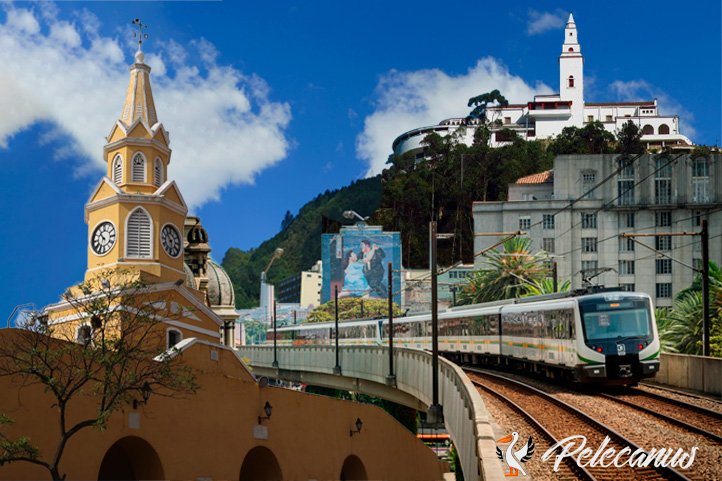Updated on 04/30/2024
Dear readers
My name is Frank and I run a tour operator in Bogota, specializing in custom-made and Colombia luxury travel.
At the end of this guide you will find a list of many other helpful travel guides for Colombia.
At the end of the guide, you’ll find additional resources for traveling in Colombia. Should you wish for a tailor-made Colombian journey, my agency is ready to make it happen.
Enjoy the journey!
Content
ToggleDiscovering Colombia: A Land of Biodiversity and Rich Culture
Colombia, a nation of contrasts and life, beckons with its rich tapestry of ecosystems and cultural heritage. This is a land where ancient civilizations, vibrant cities, and some of the world’s most incredible natural wonders coexist. Join us in this guide to uncover the geographic diversity, cultural richness, and historical significance that position Colombia as a must-visit destination.
Geography and Size
- Global Position: Colombia is nestled in the northwest of South America, bordered by Panama, Venezuela, Brazil, Peru, and Ecuador.
- Land Area: Spans 1,141,748 km² (440,831 sq mi), comparable to twice the size of Texas or the combined territories of France and Spain.
- Coastline: Over 3,200 km (about 2,000 miles) along the Pacific Ocean and the Caribbean Sea.
Biodiversity and Varied Landscapes
Species Richness: Colombia is home to over 55,000 species, it is the second most biodiverse country in the world.
Endemism: Approximately 9,000 species found in Colombia are endemic, meaning they exist nowhere else on Earth.
Notable Ecosystems:
- Amazon Rainforest: This represents about 6% of the entire Amazon Basin, which is the largest rainforest on the planet.
- Andean Region: Features the Andean mountain range, which is the longest continental mountain range in the world. In Colombian ground, the Andes splits into 3 mountain ranges.
- Sierra Nevada de Santa Marta: An isolated mountain range apart from the Andes chain that holds the title of the world’s highest coastal range.
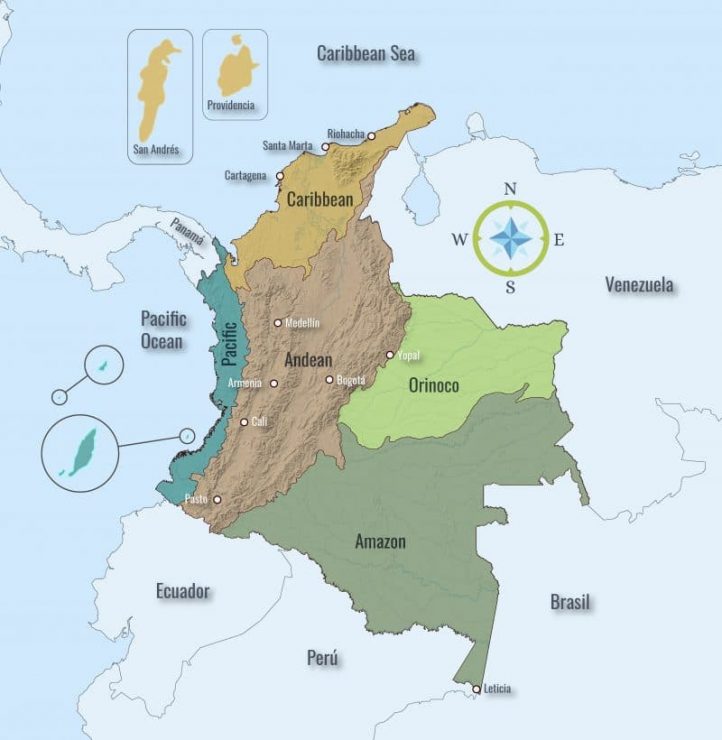
Nature Reserves:
- Chiribiquete National Park: This UNESCO World Heritage site, also known as ‘The Sistine Chapel of the Ancients,’ spans over 2.7 million hectares (6.6 million acres or 10,425 square miles). It is home to thousands of rock paintings and vast ecological richness.
- National Parks: Colombia’s national parks system conserves more than 14 million hectares (approximately 34.6 million acres), safeguarding over 12% of the nation’s territory.
Rivers and Waterways:
Colombia’s river systems are as diverse and dynamic as the country itself, featuring some of the most significant and water-rich rivers in South America.
- Magdalena River: The principal river of Colombia, running for about 1,540 kilometers (957 miles) from the Andes to the Caribbean Sea, it’s a vital waterway for transport and irrigation.
- Cauca River: The Magdalena’s main tributary, approximately 1,350 kilometers (839 miles) long, winds through the western part of the country.
- Amazon River: Although most associated with Brazil, the Amazon also flows through southern Colombia, supporting an immense variety of wildlife and vegetation.
- Caño Cristales: Often called ‘the most beautiful river in the world’ for its vibrant colors, it is found in the Serrania de la Macarena province of Meta.
- Orinoco River: Shared with Venezuela, this river’s basin is one of the largest in South America, covering an area of about 880,000 square kilometers (340,000 square miles).
Population and Culture
- Population: Over 50 million people reside in Colombia.
- Ethnic Diversity: Mestizo (mixed ancestry) at 49%, White Colombians at 37%, Afro-Colombians at 10.6%, and Indigenous peoples at 3.4%.
- Language: Spanish is the official language with numerous indigenous languages preserved and spoken.
Historical Context
- Pre-Columbian Era: Indigenous civilizations thrived, including the Muisca, Quimbaya, and Tayrona cultures. Rich cultural and technological advancements marked this period.
- Spanish Colonial Period (1499–1819): Alonso de Ojeda’s exploration in 1499 initiated Spanish contact. From the 16th century, the Spanish established colonies, exploiting resources and introducing their culture.
- Independence and Early Republic (1810–1902): The independence movement sparked on July 20, 1810, with full sovereignty achieved by 1819 under the leadership of Simón Bolívar. Colombia was part of Gran Colombia (1819–1831) and later became a separate republic. Economic dependence on agriculture, particularly coffee, shaped this era.
- Liberal and Conservative Conflicts (19th–20th centuries): Ongoing ideological and political struggles between Liberal and Conservative parties. Periodic civil wars, including the War of a Thousand Days (1899–1902). After reaching a political agreement to restore stability, there was a period of economic growth.
- Contemporary Challenges: The mid-1900s witnessed internal conflicts, including civil unrest, guerrilla movements (e.g., FARC), and the rise of drug cartels. However, recent decades showcase Colombia’s determination for stability and progress, marked by significant advances in both political and economic sectors in recent decades. A highlight is the peace agreement with FARC in 2016.
Climatic Zones and Topography
- Andean Influence: Colombia’s topography is significantly shaped by the presence of three major mountain ranges—the Andes Cordillera Oriental, Cordillera Central, and Cordillera Occidental, contributing to a diverse range of climates.
- Temperature Spectrum: The temperature spectrum in Colombia is vast, ranging from the scorching heat of the desert areas, such as La Guajira, where temperatures often exceed 30°C (86°F), to the icy conditions on mountain peaks like El Cocuy, with temperatures dipping below 0°C (32°F).
- City Weather Examples: The influence of elevation on climate despite the country’s equatorial proximity is exemplified in Colombia’s cities. Bogotá, situated at a high altitude, maintains an average temperature of 14°C (57°F). In contrast, the lower-lying Medellín enjoys a milder climate, averaging 22°C (72°F), while Cali, with its lower elevation, experiences a warmer average temperature of 24°C (75°F).
Politics
- Government Structure: A presidential representative democratic republic with a multi-party system.
- Political Evolution: Ongoing progress towards stability and democratization, especially post-2000s.
- International Role: Active participant in international affairs, prioritizing Latin American integration and cooperation.
Travel and Tourism
Visitor Statistics
- Annual Visitors: Colombia has seen a steady increase in tourism, welcoming more than 4.5 million international tourists in 2019 alone.
Development and Infrastructure
Despite significant investments, infrastructure struggles to keep pace with the rapid growth in tourism. Examples of these challenges include:
- Transportation: Limited direct international flights to key regions and insufficient road networks connecting remote areas.
- Accommodation: In popular destinations like Cartagena and Medellín, peak season demand often exceeds hotel capacity.
- Preservation: Growing foot traffic in ecologically sensitive zones and historical sites underscores the urgency for improved crowd management and conservation initiatives.
Cultural Heritage and Festivals
UNESCO World Heritage Sites: Colombia boasts several sites, including:
- The historic Walled City of Cartagena, renowned for its well-preserved colonial architecture.
- The Coffee Cultural Landscape, highlighting the tradition of coffee growing in the country’s picturesque rural settings.
- San Agustín Archaeological Park, home to over 500 monoliths, statues, petroglyphs, and sarcophagi.
Festivals: The country’s rich cultural tapestry is celebrated in festivals like:
- The Flower Festival in Medellín, featuring elaborate flower displays and Silleteros parade.
- The Barranquilla Carnival, a colorful and exuberant event recognized as a Masterpiece of the Oral and Intangible Heritage of Humanity by UNESCO.
- The Cali Fair, known for salsa dancing, music concerts, and beauty pageants.
Tourism in Colombia offers a blend of historical discovery, natural beauty, and cultural experiences. However, the increase in visitor numbers has presented challenges that the country continues to address to ensure sustainable and responsible growth in the sector.
Tourist Destinations in Colombia
Discover Colombia’s captivating Tourist Destinations, organized by geographical regions. From the Amazon rainforests to the Andean highlands, explore unique cultural and natural wonders.
Northern Caribbean Region
Cartagena and Region
This vibrant city, rich in history and culture, is a gem of the Caribbean coast. Its well-preserved old town, surrounded by walls and fortifications, reflects a blend of Spanish colonial history, pre-Columbian history, and Caribbean charm.
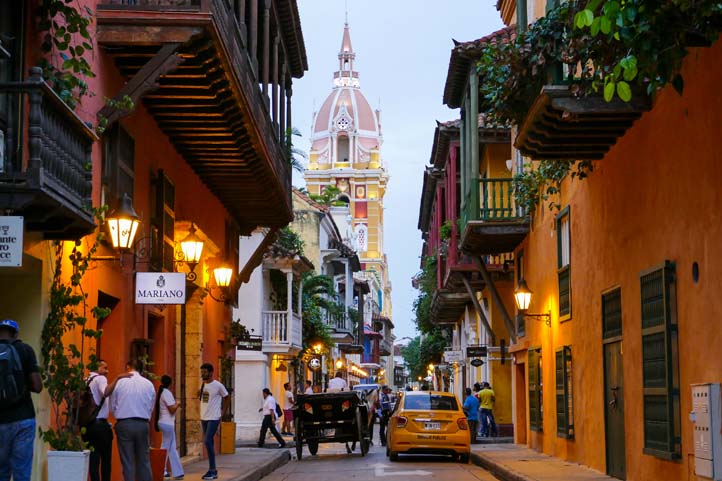
- Historic Walled City: The heart of Cartagena is filled with cobblestone streets, colorful colonial buildings, and lively plazas.
- Rosario Islands: A group of pristine Caribbean islands ideal for snorkeling, diving, and enjoying tropical marine life.
- San Basilio de Palenque: Recognized by UNESCO, this village was founded by escaped slaves and is known for preserving African traditions, language, and music.
- Mompox: A historic town on the banks of the Magdalena River, famous for its colonial architecture and filigree jewelry workshops.
For more details, check out our Cartagena Travel Guide.
Santa Marta and Region
Santa Marta is not only notable for its rich history as Colombia’s oldest city but also as a hub for exploring the diverse landscapes and cultural sites of the region. With the Caribbean Sea lapping at its shores and the Sierra Nevada de Santa Marta mountains as a dramatic backdrop, the city serves as the perfect starting point for adventurers and culture enthusiasts alike.
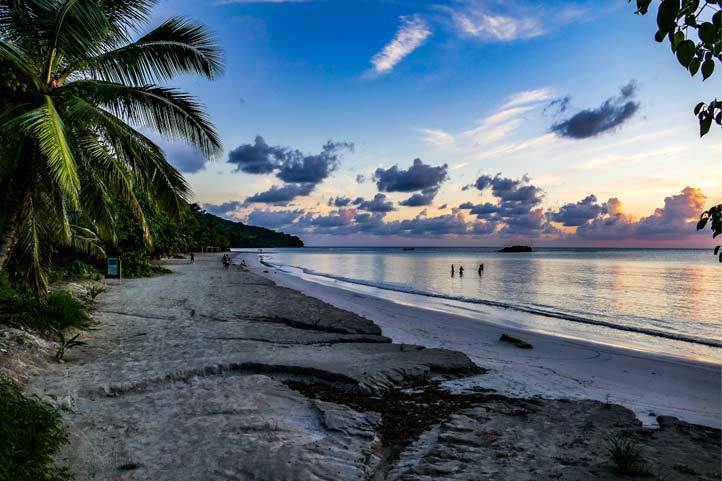
- Sierra Nevada de Santa Marta: This soaring mountain range, declared a UNESCO Biosphere Reserve, is home to an astounding variety of wildlife and indigenous communities. It’s also the starting point for the iconic Lost City Trek.
- The Lost City Trek (Ciudad Perdida): A challenging and rewarding multi-day hike that winds through lush jungle, crossing rivers, and climbing stone steps to reach the ancient ruins of the Tayrona civilization.
- Tayrona National Natural Park: Renowned for its palm-shaded coves, crystal-clear coastal waters, and biodiversity, Tayrona is a highlight for nature lovers and beachgoers.
- Minca: This tranquil mountain village is a haven for eco-tourists, known for its coffee plantations, waterfalls, and birdwatching opportunities.
- Taganga: A favorite amongst backpackers, Taganga is famous for its scuba diving schools and the relaxed atmosphere of its small beaches.
- Ciénaga: Beyond its cultural richness, Ciénaga is the gateway to the Ciénaga Grande de Santa Marta, a vast coastal wetland and a Ramsar Site important for migratory birds.
- Taironaka: Taironaka’s archeological park and nature reserve offer an insightful look into the Tairona culture with its terraces, paths, and remains of an ancient settlement, alongside a serene river setting.
For more details, check out our Santa Marta Travel Guide.
La Guajira and El Cesar
A stunning peninsula where the arid desert meets the Caribbean Sea, La Guajira is known for its unique landscapes, Wayuu indigenous culture, and some of the most spectacular beaches in Colombia.

- Cabo de la Vela: A small fishing village turned tourist destination, it is revered for kite surfing and its pristine beaches like Playa Dorada.
- Punta Gallinas: The northernmost point of South America, famous for its dramatic dunes, flamingo populations, and remote beaches.
- El Cerrejón: One of the world’s largest open-pit coal mines, which can be visited with a guided tour to learn about the industrial side of the region.
Primarily known for its musical heritage and the Vallenato Legend Festival, El Cesar is also home to a variety of natural and cultural attractions.
- Valledupar: The capital city of El Cesar, known as the heart of Vallenato music, a UNESCO Intangible Cultural Heritage. Visitors can explore the Vallenato Legend Park and attend live performances in the city’s various venues.
- Los Besotes Ecopark: A natural reserve near Valledupar with dry tropical forest, it’s ideal for hiking, bird watching, and enjoying panoramic views of the region.
- Nabusímake: A sacred site for the Arhuaco indigenous people, often called “The Earth’s Heart,” where visitors can learn about the Arhuaco culture and traditions.
For more details, also check out our La Guajira Travel Guide and Valledupar Travel Guide.
Andean Region
Medellin and Region
The city of Medellín, nestled in the Aburrá Valley and known as the “City of Eternal Spring,” is renowned for its perfect climate, innovative public transport system, and the cultural renaissance that has taken it from a turbulent past to a bright, artistic, and tourist-friendly present.
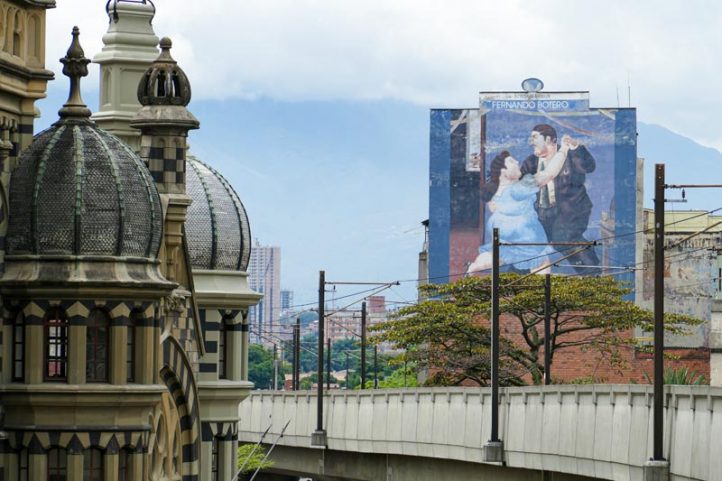
- Innovative Urbanism: Marvel at the network of cable cars and escalators that connect the city’s neighborhoods, symbolizing Medellín’s commitment to social innovation and urban renewal.
- Botero Plaza: Home to 23 bronze sculptures donated by the Colombian artist Fernando Botero, this outdoor museum in the heart of Medellín is a popular attraction.
- Comuna 13: Once a hotspot for urban conflict, it’s now a vibrant community bursting with expressive street art, live music, and dance performances.
- Guatapé and El Peñol: The charming town of Guatapé and the imposing granite monolith of El Peñol are a short trip away, offering climbing, boating, and stunning landscapes.
- Santa Fe de Antioquia: Step back in time with a visit to this colonial town known for its preserved architecture and the iconic Puente de Occidente, a national monument.
- Jardín: Wander through the colorful streets of Jardín, a picturesque town with coffee shops, traditional homes, and the backdrop of the Andean mountains.
- Jericó: Known for its religious significance and beautiful botanical gardens, Jericó is also the birthplace of Colombia’s first saint, Mother Laura.
- San Carlos: A haven for eco-tourists, San Carlos is dotted with waterfalls and natural swimming holes, and is a testament to the country’s peace and reconciliation process.
For more details, check out our Medellin Travel Guide.
Bogotá and Region
Colombia’s capital city, Bogotá, sits high in the Andes at 2,640 meters (8,660 feet) above sea level. This city is a blend of historical gravitas, cultural vibrancy, and urban sophistication. The cool climate, owing to its elevation, provides a refreshing contrast to the country’s coastal regions.
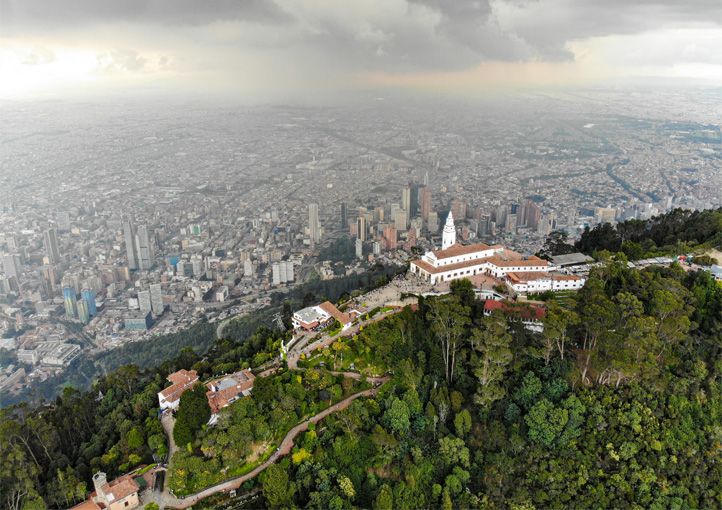
- La Candelaria: The city’s old quarter is a vibrant tapestry of colonial buildings, museums, and cultural sites.
- Monserrate: Dominating the city’s skyline, this mountain is a cultural and pilgrimage site with unparalleled views of the capital.
- Museo del Oro: This renowned museum houses a staggering collection of pre-Columbian gold artifacts, offering a glimpse into the ancient cultures of Colombia.
- Botero Museum: A homage to the acclaimed Colombian artist Fernando Botero, this museum also features works from other world-renowned artists.
- Salt Cathedral of Zipaquirá: An architectural wonder, this cathedral is hewn from the halite rock within the depths of a former salt mine and stands as an artistic and religious masterpiece.
- Laguna de Guatavita: Mythical and serene, this crater lake is shrouded in the legend of El Dorado and is a site of natural beauty and cultural significance.
- Usaquén: A charming district known for its flea market, artisanal shops, and the preserved architecture of a bygone era, offering a quaint escape within the city.
- Jardín Botánico de Bogotá: A living museum of Colombia’s diverse plant life, the botanical garden is a peaceful green space for relaxation and education in the midst of the urban hustle.
- Chingaza National Park: Home to unique páramo ecosystems and a variety of wildlife, Chingaza is a destination for those seeking the tranquility of nature and outdoor activities like hiking.
For more details, check out our Bogota Travel Guide.
Boyacá
Known as the “Land of Freedom” for its role in Colombia’s battle for independence, Boyacá is a region that combines lush mountain landscapes, colonial towns, and indigenous heritage. Its temperate climate offers a refreshing atmosphere for exploration.
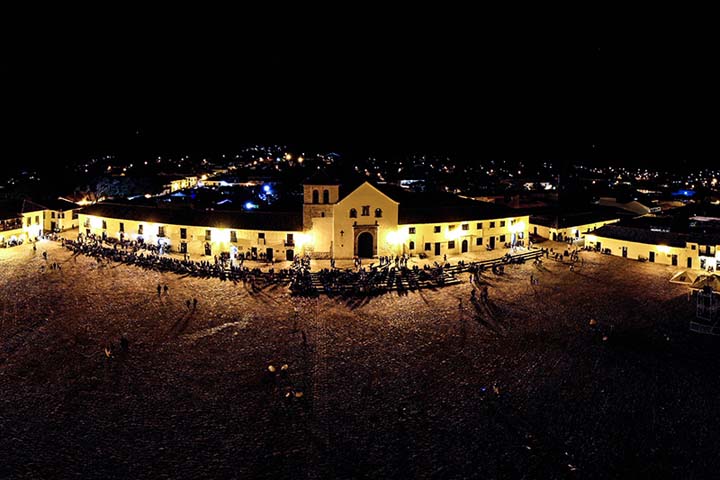
- Villa de Leyva: A colonial gem with one of the largest cobbled squares in South America, surrounded by well-preserved buildings and a rural landscape that seems frozen in time. It offers fun nature activities too.
- Lake Tota: The largest lake in Colombia, known for its white-sand beach at Playa Blanca and opportunities for water sports and trout fishing.
- Monguí and Páramo de Ocetá: Another picturesque town in Boyacá, known for its beautiful basilica, cobbled streets, and traditional soccer ball manufacturing. One of the most beautiful páramo ecosystems in the world, Páramo de Ocetá features unique flora such as the Frailejones and offers spectacular trekking opportunities.
- Ráquira: This small town is famous for its pottery and vibrant market where local artisans sell their colorful wares.
- El Cocuy National Natural Park: A park boasting glacial peaks, it is a haven for hikers and mountaineers looking to traverse its challenging high-altitude trails.
For more details also check out our Boyaca Travel Guide.
Santander
This region is renowned for its rugged landscapes, rich history, and the adventure sports it offers. Santander’s terrain, marked by the Andean mountains, deep canyons, and rushing rivers, makes it a prime destination for thrill-seekers and nature lovers alike.
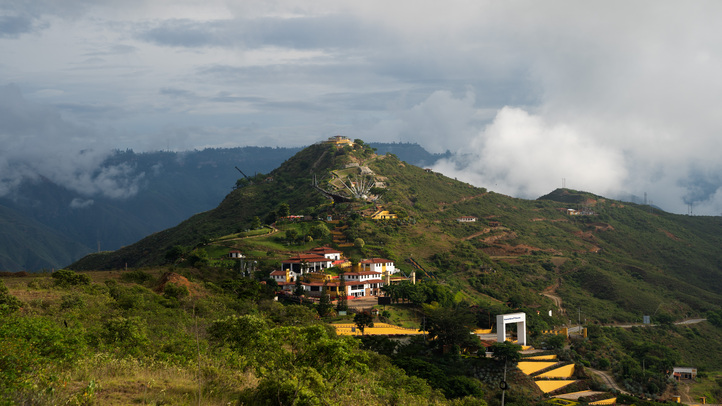
- San Gil: Known as Colombia’s adventure capital, San Gil is the go-to destination for activities such as white-water rafting, paragliding, and caving.
- Barichara: Often referred to as the most beautiful town in Colombia, Barichara boasts well-preserved colonial architecture and a tranquil atmosphere.
- Chicamocha National Park: This park features the Chicamocha Canyon, which offers spectacular views and activities like cable car rides across the canyon, hiking, and paragliding.
- El Socorro: A town with historical significance in Colombia’s fight for independence, known for its colonial churches and peaceful squares.
- Bucaramanga: The capital of Santander and known as the “City of Parks,” it’s a vibrant city with green spaces, modern amenities, and a gateway to the region’s natural sites.
- Cave of the Cow (Cueva de la Vaca): A caving destination near San Gil that attracts spelunkers looking to explore its underground passages and streams.
- The Santander Coffee Zone: While lesser-known than the Coffee Triangle, this area offers a rich coffee culture with opportunities for farm tours and tastings.
For more details, check out our Santander Travel Guide.
Coffee Triangle (Eje Cafetero)
This picturesque region, part of the Paisa heartland, is celebrated for its green, undulating landscapes punctuated by coffee plantations and cloud forests, which together form a UNESCO World Heritage site. It covers the departments of Quindío, Risaralda and Caldas.
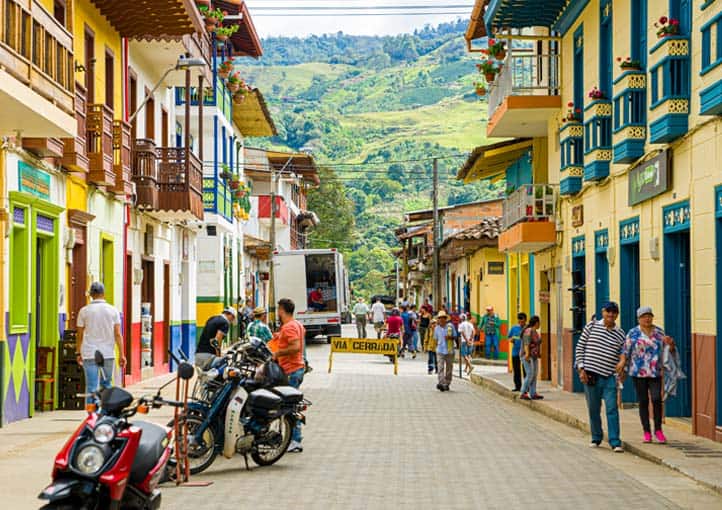
- Salento: With its vibrant colonial architecture and proximity to the stunning Cocora Valley, Salento is a must-visit for those looking to experience the culture and natural beauty of the Coffee Triangle.
- Manizales: This city offers a mix of urban amenities and natural wonders, with close access to the Nevado del Ruiz volcano.
- Pereira: Serving as a central hub for the region, Pereira offers a blend of cultural activities and is a gateway to nearby thermal springs and coffee farms.
- Armenia: A city surrounded by some of Colombia’s most productive coffee plantations, Armenia is the beating heart of the region’s coffee culture.
- Salamina: Known as the ‘City of Light’, Salamina is a hidden gem with well-preserved colonial architecture and a peaceful atmosphere, surrounded by lush landscapes and traditional coffee farms.
- Filandia: A small town that stands out for its colorful architecture, artisanal baskets, and viewpoints like the Mirador de la Colina, offering panoramic views of the Cauca River valley.
- Nevado del Ruiz: A snow-capped volcano that provides visitors with a chance to see glaciers up close and is known for its beautiful Paramillo del Quindío and the thermal waters of the Termales del Ruiz.
- Nevado del Tolima: A more challenging climb than its counterpart, Nevado del Ruiz, it appeals to experienced mountaineers seeking a demanding ascent through diverse ecosystems.
- Valle del Cocora: This cloud forest valley is famed for the Quindío wax palm, the national tree of Colombia, which towers over the landscape at heights of up to 60 meters (200 feet).
For more details, check out our Coffee Triangle Travel Guide.
Pacific Region
Cali and Region
Colombia’s third-largest city and a hub for cultural and economic activity in the southwest of the country. Known for its festive atmosphere, Cali is a city that dances to the rhythm of its Afro-Colombian heritage.
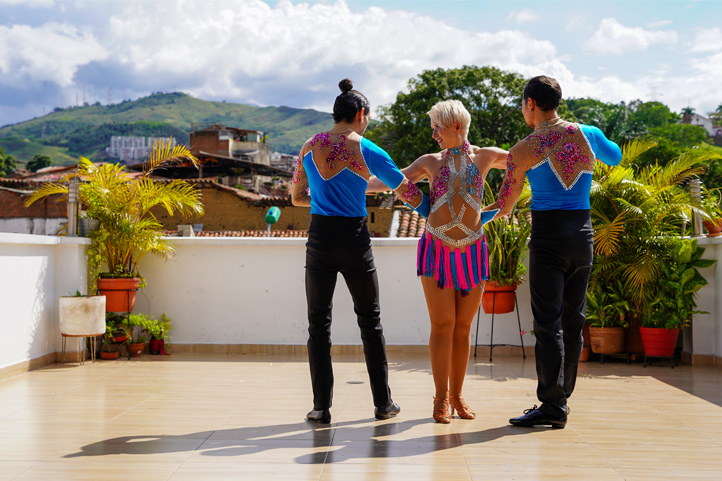
- Salsa Culture: The city’s salsa clubs are a testament to its vibrant music scene, and the annual World Salsa Festival is a major draw.
- Historic District: Cali’s historic San Antonio neighborhood is renowned for its colonial architecture and hilltop views of the city.
- Gastronomy: Cali offers a rich culinary tradition, with a variety of local and international cuisine that reflects its cultural diversity.
- Cali Zoo (Zoológico de Cali): Considered one of the best zoos in South America, it provides a naturalistic habitat for a diverse array of wildlife, emphasizing Colombian and South American species.
- Cristo Rey Statue: Similar to Rio de Janeiro’s Christ the Redeemer, Cali’s Cristo Rey statue stands atop a hill offering panoramic views of the city.
- Pance River: A popular spot for Cali residents, offering fresh mountain water for swimming and a lush environment perfect for picnics and relaxation.
- La Vorágine: Close to Cali, this natural reserve is ideal for hiking and nature walks, known for its biodiversity and beautiful waterfalls.
- Sugar Cane Museum (Museo de la Caña de Azúcar): Located in a former sugar plantation, this museum tells the story of sugar production in the region and its importance to the Colombian economy.
For more details, check out our Cali Travel Guide.
Chocó
Chocó, located on Colombia’s Pacific coast, is a region celebrated for its rich biodiversity and cultural diversity. It’s one of the country’s most pristine and untouched areas, with dense rainforests, an extensive network of rivers, and a coastline that’s a haven for humpback whales during the mating season.
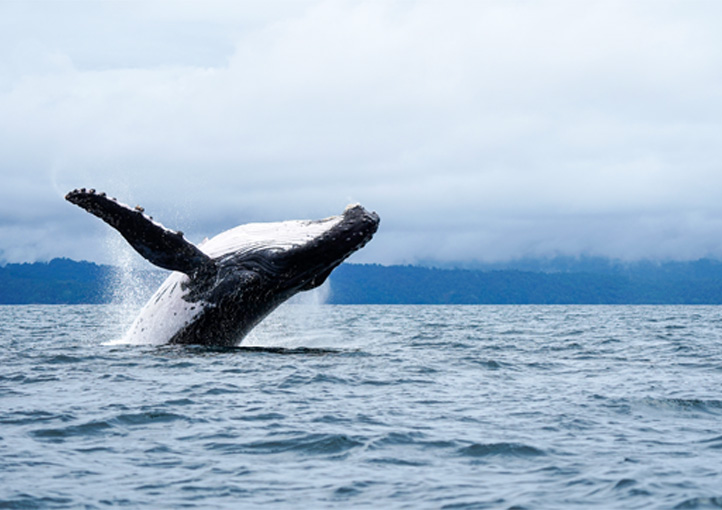
- Bahía Solano and Nuquí: These coastal towns are gateways to some of the most biodiverse areas in Colombia, offering eco-lodges and opportunities for jungle trekking, bird watching, and whale watching.
- Utría National Natural Park: A marine and coastal park that’s a sanctuary for humpback whales, dolphins, and sea turtles, with unique mangrove ecosystems.
- El Valle: Known for its beautiful beaches like Playa Almejal, and its proximity to the Ensenada de Utría where you can find coral reefs and diverse marine life.
- Capurganá and Sapzurro: Small and remote seaside villages near the Panamanian border, accessible only by boat or plane, offering tranquil beaches and coral reefs for snorkeling and diving.
For more details, check out our Chocó Travel Guide.
Southern Colombian Region
Popayán and Region
Often referred to as “La Ciudad Blanca” or “The White City” for its well-preserved downtown’s whitewashed buildings, Popayán is one of Colombia’s most impressive colonial cities. It’s known for its historical, religious, and cultural significance, particularly during Holy Week celebrations.
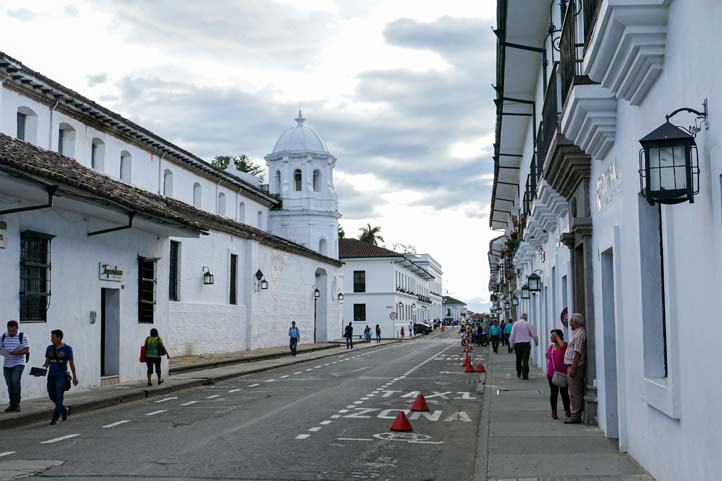
- Historic Center: The city’s colonial architecture, cobblestone streets, and churches, including the famed Iglesia de San Francisco, are some of the most pristine in Latin America.
- University of Cauca: One of Colombia’s oldest and most respected universities, contributing to the city’s youthful and vibrant atmosphere.
- Holy Week Processions: These UNESCO-listed events are some of the most elaborate and ceremonial in the Western Hemisphere, attracting visitors from around the world.
- Museums and Gastronomy: Explore the city’s museums like the Museo Arquidiocesano de Arte Religioso and taste the traditional cuisine, including the famous Pipian empanadas.
- Silvia: Known for its large indigenous market, Silvia is a place where you can experience the rich and colorful traditions of the local Guambiano community.
- Puracé National Park: Home to the Puracé Volcano, the park offers opportunities for trekking, wildlife watching and soaking in hot springs, with the chance to see the Andean condor.
- Tierradentro National Archaeological Park: A short drive from Popayán, this park features underground tombs and pre-Hispanic sculptures, another UNESCO World Heritage site that highlights the area’s deep historical roots.
For more details, check out our Popayan Colombia Travel Guide.
Huila
The department of Huila is a region rich in archaeological significance and natural splendor. It is renowned for its pre-Columbian history, coffee production, and the stunning landscapes of the Colombian Massif.
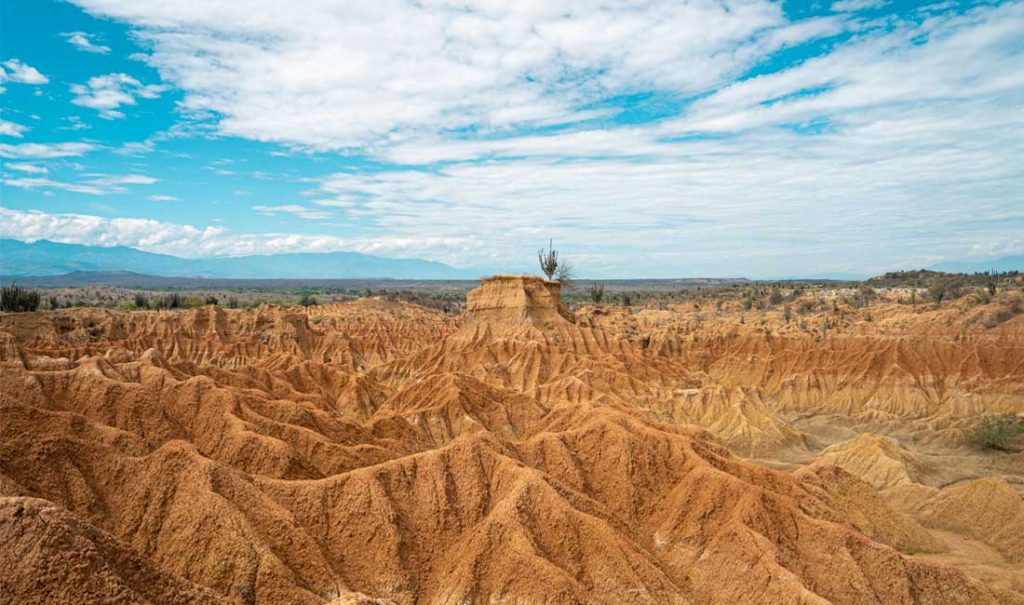
- San Agustín Archaeological Park: This UNESCO World Heritage site is one of the most important archaeological locations in Colombia, featuring an extensive complex of monuments, megalithic sculptures, and tombs from a forgotten Andean civilization.
- Desierto de la Tatacoa: A strikingly beautiful desert known for its dramatic, eroded landscapes, which offer some of the clearest skies in the country for stargazing.
- Huila Coffee Culture: As part of the Colombian coffee-growing axis, Huila’s coffee plantations can be visited to learn about the bean-to-cup process in this less-traveled region.
- Neiva: The capital city of Huila, Neiva is a commercial and cultural center known for its Bambuco Pageant and Folkloric Festival, which celebrates Andean music and dance.
- River Magdalena: Huila is home to the upper reaches of the Magdalena, Colombia’s principal river, which offers opportunities for riverboat tours and fishing.
- Betania Dam: A man-made lake that is a popular spot for water sports and recreation.
- Puracé National Natural Park: Known for its active volcano, hot springs, and the opportunity to spot the majestic Andean condor.
For more details, check out our Neiva Travel Guide
Putumayo
Located in the southwestern part of Colombia, bordering Ecuador and Peru, Putumayo is a region enveloped by the Amazon Rainforest. It’s known for its rich biodiversity, indigenous communities, and as a place for ecotourism and adventure in the heart of the Amazon basin.
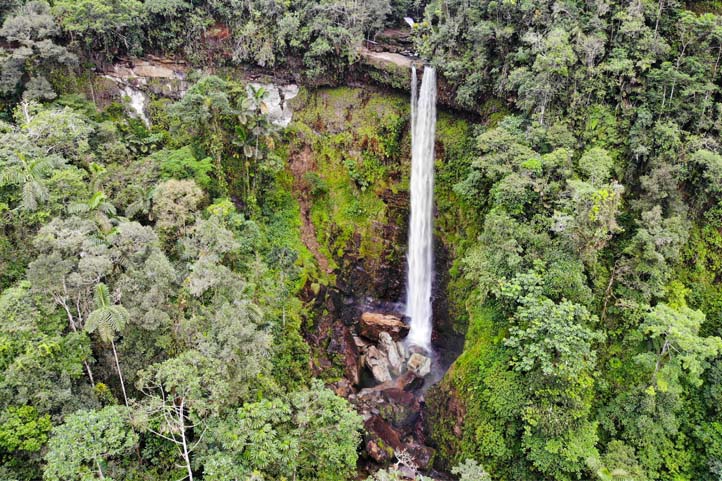
- Mocoa: The capital of Putumayo, Mocoa is a launching point for jungle treks and visits to nearby natural attractions, such as the end of the Andes mountain range where it meets the Amazon.
- Sibundoy Valley: A serene valley with a significant indigenous presence, known for its traditional handicrafts and cultural festivals.
- Fin del Mundo: A natural reserve near Mocoa, offering a hike to a series of waterfalls and a viewpoint known as “The End of the World” for its panoramic jungle vistas.
- Puerto Asís: A bustling river port and commercial hub, providing access to the Putumayo River and trips into deeper parts of the Amazon Rainforest.
Nariño
Situated at Colombia’s southernmost point, bordering Ecuador, Nariño is characterized by its varied landscapes, from the coastal plains on the Pacific shore to the high Andean peaks. This region is celebrated for its artisanal crafts, indigenous cultures, and the dramatic beauty of the Las Lajas Sanctuary.
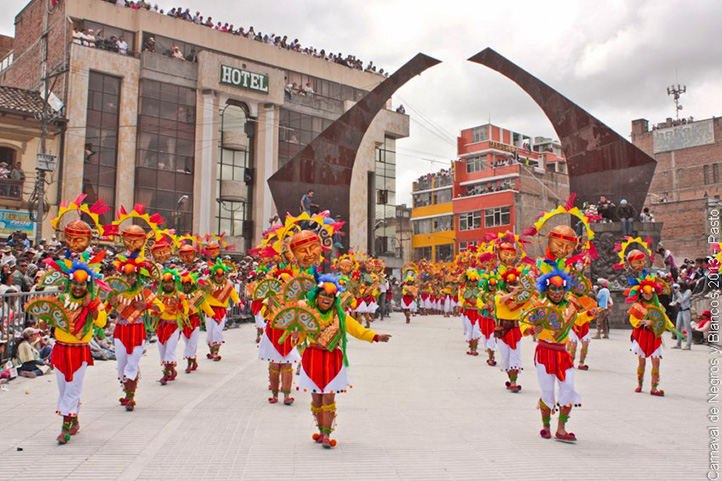
- Pasto: The capital city, known for its Carnaval de Negros y Blancos, is a UNESCO Intangible Cultural Heritage event, where the city erupts in celebration with parades, music, and elaborate costumes.
- Las Lajas Sanctuary: An awe-inspiring Gothic church built into a canyon, it is a pilgrimage site perched on a bridge spanning a river gorge.
- Laguna de la Cocha: A serene high-altitude lake surrounded by forests and traditional homes, offering boat trips and opportunities to enjoy the local trout cuisine.
- Tumaco: A port town on the Pacific coast, Tumaco is known for its beaches, Afro-Colombian culture, and as a gateway to the mangrove-rich Pacific coast.
- Volcán Galeras: An active volcano near Pasto, it provides scenic views and is a symbol of the region. The surrounding national park offers trails and natural hot springs.
- Awá Indigenous Reserve: Home to the Awá people, this reserve offers insights into the lives of one of Colombia’s many indigenous groups and their efforts to maintain traditional ways of life.
For more details also check out our Pasto Colombia Travel Guide.
Colombian Amazonas Region
The Amazonas region of Colombia is a vast, remote area dominated by the Amazon Rainforest, the largest rainforest in the world. This region is a treasure trove of biodiversity and indigenous cultures, with the Amazon River winding its way through dense jungle and tropical landscapes.
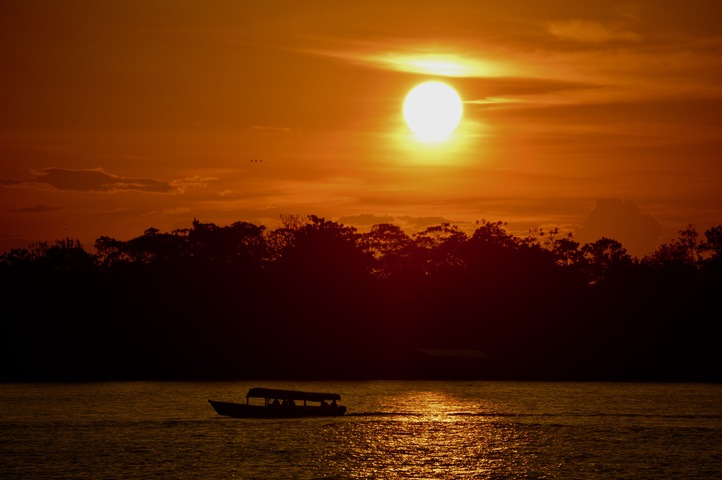
- Leticia: The capital of the department and a major hub for Amazonian tourism, Leticia provides access to the river and rainforest, with opportunities for eco-tours and cultural exchanges with local indigenous communities.
- Puerto Nariño: A small, peaceful town further up the Amazon River from Leticia, known for its commitment to conservation and sustainable tourism.
- Indigenous Communities: The Amazonas region is home to numerous indigenous groups, and visits can often be arranged for travelers to learn about their traditions, crafts, and way of life.
For more details, check out our Amazonas Travel Guide.
Orinoquía Region (Eastern Plains)
Stretching from the Andes to the Venezuelan border, the Eastern Plains, or Llanos, are a vast expanse of grasslands, wetlands, and savannas. This region is known for its rich biodiversity, the cowboy (llanero) culture, and is a prime destination for eco-tourism and bird-watching.
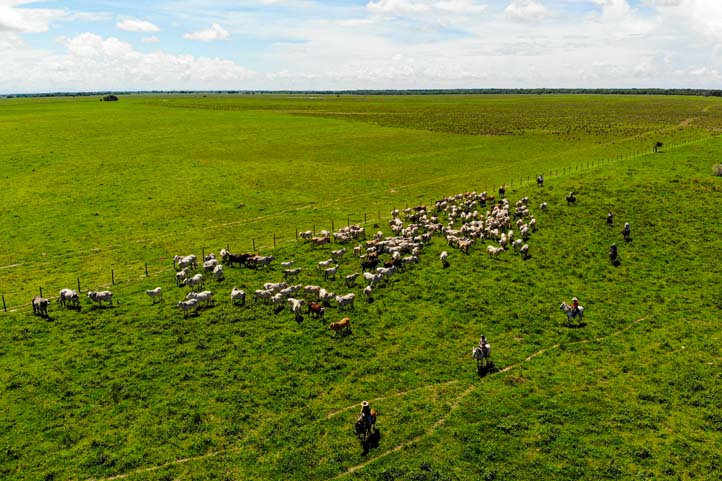
- Villavicencio: The gateway to the plains, known for its cattle ranching culture and the Coleo events (Colombian rodeo), it’s a city where the llanero spirit is alive and well.
- Caño Cristales: Often referred to as the “River of Five Colors” or “Liquid Rainbow,” this river in Serranía de la Macarena National Park is famous for its vibrant hues during certain months of the year.
- Los Llanos: These vast savannas are home to a variety of wildlife, including capybaras, anacondas, and hundreds of bird species, making it an ideal place for safari-like tours.
- Parque Nacional Natural El Tuparro: A protected area featuring unique Orinoco landscapes, with rivers, forests, and savannas that support species such as river dolphins, jaguars, and giant otters.
- Yopal: The capital of the Casanare department, Yopal is surrounded by nature reserves and serves as a base for exploring the area’s rich ecosystems.
- La Macarena: Besides Caño Cristales, the town of La Macarena serves as an access point to a variety of natural attractions within the national park, including hiking trails and waterfalls.
For more details, check out our Llanos Travel Guide.
Colombian Islands
Colombia’s islands provide a diverse range of experiences from the idyllic Caribbean to the wild Pacific. These islands are celebrated for their white sandy beaches, coral reefs, diverse marine life, and the unique cultures that have developed on their shores.
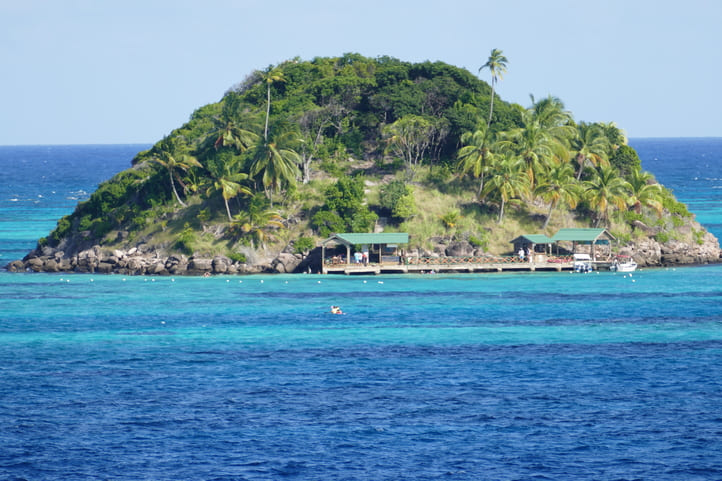
- Gorgona Island: Once a prison island in the Pacific, it is now a national park known for its biodiversity, especially its marine species like humpback whales and sea turtles.
- Malpelo Island: A small island in the Pacific, Malpelo is a favorite for experienced divers looking to see large marine predators in their natural habitat.
- San Andrés: The largest of the island group, San Andrés is known for its vibrant music scene, duty-free shopping, and the beautiful Spratt Bight Beach.
- Providencia: A UNESCO Biosphere Reserve, Providencia is less developed than San Andrés, offering unspoiled beaches, rich Afro-Caribbean culture, and excellent diving spots like Crab Cay.
- Santa Catalina: Connected to Providencia by a colorful footbridge called the Lovers’ Bridge, Santa Catalina offers quiet beaches and historical sites, including the ruins of a fort.
For more details, check out our San Andres Island Travel Guide and Providencia Travel Guide.
Top Things to Do in Colombia
Cultural Experiences
Immerse yourself in Colombia’s rich tapestry of culture with a range of experiences that highlight the country’s history, art, and traditions.
Festivals
- Barranquilla Carnival (Barranquilla): Revel in one of the largest carnivals in the world, featuring parades, music, and dance that showcase the country’s Afro-Caribbean culture.
- Flower Festival (Medellín): Celebrate the region’s flower-growing heritage with vibrant displays, traditional Silleteros (flower carriers), and public concerts.
- Cali Fair (Cali): Join salsa enthusiasts in this week-long festival filled with dance performances, concerts, and bullfighting.
For more details, check out Colombia’s 45 Best & Biggest Festivals.
Museums
- Gold Museum (Bogotá): Explore the largest collection of pre-Hispanic gold artifacts and learn about the indigenous cultures that once thrived here.
- Botero Museum (Bogotá): Admire the work of Colombia’s most famous artist, Fernando Botero, as well as pieces by other renowned international artists.
- Cartagena Naval Museum (Cartagena): Discover the maritime history of the Caribbean and the fortifications of this historic port city.
For more details, check out our Colombia Museum Guide.
Music and Dance
- Salsa Clubs (Cali): Experience the energy of salsa in the world’s salsa capital. Take lessons or enjoy live performances.
- Vallenato Legend Festival (Valledupar): Delve into the sounds of vallenato, a traditional Colombian music genre, in the city where it originated.
- Cumbia (Coastal Regions): Attend traditional cumbia music and dance performances, especially vibrant in cities like Cartagena and Barranquilla.
Adventure Activities
Colombia’s diverse ecosystems provide a playground for adventure lovers, with activities ranging from serene hikes to adrenaline-fueled sports.
Hiking
- Lost City Trek (Sierra Nevada): Embark on a multi-day hike through indigenous villages and lush jungles to reach the ancient archaeological site of Ciudad Perdida.
- Cocora Valley (Salento): Wander among the world’s tallest palm trees and enjoy the verdant landscapes of the coffee region.
- Los Nevados National Park (Central Andes): Hike or climb in this park, which offers a range of trails leading to snow-capped volcanoes and high-altitude lakes.
- Lengerke Trail (Santander): One of the greatest hikes in Colombia, I actually opened this trail for international clients.
For more details, check out our blog Best 9 Hiking Regions and 27 Routes in Colombia For Travelers.
Diving
- San Andrés and Providencia: Dive into crystal-clear waters to explore vibrant coral reefs, shipwrecks, and diverse marine life.
- Rosario Islands (Near Cartagena): Snorkel or dive in the protected marine park to witness a colorful array of tropical fish and coral formations.
For more details, check out our blog The 7 Top Dive Sites in Colombia – Detailed Guide
Zip-Lining
- Coffee Region (Manizales and Armenia): Glide over coffee plantations and lush landscapes on one of the many zip-line courses offered in the region.
- San Gil: Challenge yourself with extreme zip-lining experiences over canyons and rivers in this adventure tourism hotspot.
Culinary Guide
Colombian cuisine is a delicious exploration of regional flavors and culinary traditions that are not to be missed.
Dishes to Try
- Bandeja Paisa: A platter of beans, rice, chorizo, avocado, fried egg, and more, typical of the Antioquia region.
- Arepas: Cornmeal cakes that are a staple of Colombian cuisine, with varieties differing from region to region.
- Ceviche: Enjoy this fresh seafood dish on the coast, especially in cities like Cartagena and Santa Marta.
For more details, check out our blog Colombian Dishes and Food From All Regions You Should Try.

Food Tours
- Bogotá: Discover Colombia’s culinary diversity with a food tour in the capital, sampling everything from street food to gourmet cuisine.
- Cartagena: Experience the coastal flavors with a guided tour that will take you through local markets and traditional eateries.
Nightlife
Bogotá: The Cosmopolitan Heartbeat
- Zona T and Parque 93: The epicenters of Bogotá’s nightlife with trendy bars, high-end clubs, and live music venues that cater to a sophisticated crowd.
- La Candelaria: For a more bohemian night out, the historic district offers cozy pubs and cultural spots with live Andean and Caribbean music.
Medellín: The City That Never Sleeps
- Parque Lleras: In the heart of the El Poblado district, this area is known for its bustling nightlife with a multitude of bars and clubs within walking distance of each other.
- La 33 and La 70: Streets famous for their local vibe, dance halls, and salsa bars where the rhythm of the city really comes alive.
Cali: Salsa Capital of the World
- Juanchito: On the east side of the city, this is the place to experience authentic salsa with clubs that stay open until dawn.
- Granada and Menga: Districts that offer a mix of salsa clubs and contemporary nightlife with stylish bars and dance venues.
Cartagena: Tropical Nights by the Sea
- Getsemaní: Once a working-class neighborhood, now a hotspot for nightlife with rooftop bars, sizzling dance floors, and a variety of live music that reflects the city’s Afro-Caribbean soul.
- Bocagrande: A more upscale area with chic beach clubs, cocktail bars, and lounges with stunning ocean views.
Entertainment Venues
- Teatro Colón (Bogotá): Catch a performance at this beautiful and historic theater, offering everything from opera to ballet.
- Live Music (Nationwide): From jazz in Bogotá to vallenato in Valledupar, live music is an essential part of Colombian nightlife.
For more details, check out our blog Understand Colombia’s Nightlife: Party Like Never Before.
Nature Experiences in Colombia
Colombia’s wealth of natural habitats makes it an exceptional destination for nature lovers. Here’s a list of experiences that allow you to immerse yourself in the country’s stunning biodiversity.
- Leticia and Surrounding Area: Embark on guided tours through the dense Amazon jungle, visit indigenous communities, and cruise along the Amazon River.
- Nuquí and Bahía Solano (Chocó): Between July and October, these areas become prime spots for witnessing humpback whales as they migrate to warmer waters to breed.
- Llanos Safari (Eastern Plains): Venture on a safari-like experience in the Llanos, where you can spot capybaras, anacondas, and hundreds of bird species in their natural grassland habitats.
- Ciénaga Grande de Santa Marta: Explore this unique coastal lagoon system by boat, a vital habitat for a diverse range of birdlife.
- Utría National Natural Park (Chocó): Traverse through the mangroves, rainforest, and coastal ecosystems in one of the most biodiverse regions in the world.
- Tatacoa Desert (Huila): Wander through the red and grey otherworldly formations of this arid zone, which is also an excellent place for stargazing.
- Santa Marta Mountains: These mountains are a birding paradise with endemic species found nowhere else on Earth.
- Eje Cafetero Birding Trails: The coffee region also offers lush landscapes where you can observe a myriad of bird species amongst the coffee plantations.
For more details, check out our blog 33 Colombian Nature Travel Destinations.
17 Heritage Towns
The 17 heritage towns of Colombia, designated as such to preserve their historical and architectural significance, are exemplars of the country’s colonial legacy, spanning from the 16th to the 18th centuries. They feature an array of well-preserved structures, including churches, monasteries, and public spaces that date back to the Spanish conquest and colonization.
These towns, such as Villa de Leyva founded in 1572 and Barichara established in 1705, serve as living museums, each presenting a snapshot of Colombia’s historical timeline. Their strategic importance varied, with some serving as trading hubs or military outposts. Today, they attract both national and international tourists, yet their infrastructure and accessibility differ. So some towns are more remote and less modified by modern conveniences, offering a more unadulterated historical experience.
7 Wonders of Colombia
The “7 Wonders of Colombia” are the most emblematic sites that can be found in Colombia.
- The Salt Cathedral of Zipaquirá – An underground church built within the halite (rock salt) tunnels of a mine, 200 meters below ground. This architectural marvel, inaugurated in 1954, not only serves as a place of worship but also as a cultural attraction.
- The Sanctuary of Las Lajas – A neo-Gothic church built on a bridge spanning a river gorge, famous for its location and the legend of the Virgin Mary’s apparition, which draws pilgrims and tourists alike.
- San Agustín Archaeological Park – A UNESCO World Heritage site recognized for its large collection of religious monuments and megalithic sculptures, it is one of the most important archaeological sites in Colombia with artifacts dating back to the 1st century AD.
- Fortifications of San Felipe de Barajas in Cartagena – A masterpiece of colonial military engineering, this fortress was constructed in the 17th century to protect the city from pirate attacks and is one of the most formidable defensive complexes in South America.
- The Lost City (Ciudad Perdida) – Believed to have been founded around 800 CE by the Tairona people, this ancient city is nestled in the dense jungles of the Sierra Nevada de Santa Marta and was rediscovered in the 1970s.
- Tierradentro Archaeological Park – Another UNESCO World Heritage site, it features a series of underground tombs and sculptures dating back to the 6th to 10th centuries AD, reflecting the pre-Columbian culture of the region.
- Teatro Colón (Christopher Columbus Theater) – Located in Bogotá, this national monument and performing arts center was opened in 1892 and is an important cultural venue for the performing arts in Colombia.

Practical Information for Traveling in Colombia
How to Get to Colombia
Flights
- International Airports: Colombia is well-connected with international airports in major cities like Bogotá (El Dorado International Airport), Medellín (José María Córdova International Airport), Cali (Alfonso Bonilla Aragón International Airport), and Cartagena (Rafael Núñez International Airport).
- Major Airlines: Most international airlines fly to Colombia, including direct flights from the United States, Europe, and Latin America.
Here you can find all you need to know about flights to Colombia.
Entry Requirements
- Visas: Many travelers (including those from the US, Canada, the EU, and Australia) do not need a visa for stays of up to 90 days. Before these 90 days have expired, you can extend it for another 90 days. You can therefore spend up to 180 days in Colombia per calendar year.
- Passport Validity: Your passport should be valid for a minimum of six months beyond the date of entry.
- Return Ticket: You may be required to show proof of onward travel. This means that you have to have a ticket to leave the country. There are tricks, so it’s best to search online.
- Customs: Be aware of restrictions on items that can be brought into the country, including agricultural products and large sums of currency.
Getting Around Colombia
Transportation within Colombia
- Domestic Flights: Efficient for long distances given the country’s topography. All major cities and tourist destinations are served by domestic flights.
- Buses: Extensive network connects cities and towns, varying from luxury coaches to local minibuses.
- Taxis and Ride-Sharing Apps: Available in cities, often a convenient and economical way to travel short distances.
- Car Rentals: An option for those who prefer flexibility, though driving can be challenging due to road conditions and traffic laws. I do not recommend it to tourists.
- Biking: Some cities like Bogotá offer bike rental systems and have dedicated cycle routes.
Find all the details in our blog Transportation in Colombia Expert Guide.
Accommodations
Hotels, Hostels, Eco-lodges
- Hotels: Range from luxury international chains to boutique establishments.
- Hostels: Popular among budget travelers, widely available in tourist areas with options for private rooms or dorms.
- Eco-lodges: Offer immersive nature experiences, particularly in the Amazon and along the Caribbean coast.
- Booking: It’s advisable to book in advance, especially during high season or local festivals.
Explore these fantastic blogs for hotel recommendations in Colombia. By booking through the provided links, you support us with a commission – Thank you in advance!
- 29 Luxury & Boutique Hotels in Cartagena
- The Best Hotels in Bogota
- 19 Coolest Beach Hotels in Colombia
- My 10 Best Hotels in Colombia
- 32 Glampings in Colombia
- 20 Colombian Ecolodges
- The Best Hotels in Medellin
- The Best Spa Hotels in Bogota
- Spa Hotels and Hot Springs in Colombia
- The 12 Best Hotels in Salento
- The 8 Best Hostels in Medellin
- The 14 Best Hostels in Salento
Safety Tips
- Valuables: Keep them secure and out of sight. Use hotel safes when available.
- Local Advice: Heed recommendations from your accommodation about safe vs. unsafe neighborhoods, especially at night.
- Travel Insurance: Always travel with insurance that covers theft, loss, and medical issues.
- Emergency Numbers: Familiarize yourself with local emergency contacts, such as the tourist police. The general emergency phone number is 123.
Still concerned? Dive into more insights in our blog Is Colombia Safe To Travel To In 2024?
Health Advice
Vaccinations and Health Care Services
- Vaccinations: Recommended to be up to date with routine vaccinations. Yellow fever, typhoid, and hepatitis A vaccines are also recommended.
- Health Care: Private health care facilities in major cities provide high standards of care, but it’s essential to have adequate travel health insurance.
- Pharmacies: Widely available and can provide assistance with minor health concerns.
Also check out our detailed medical advice for Colombia blog, which includes a video interview with a local doctor in English.
Budget Tips and Cost Breakdowns
- Daily Budget: Can vary widely. Budget travelers can get by on as little as $30-50 USD per day, while mid-range travelers might spend between $50-150 USD.
- Accommodation: Hostel dorm beds might cost $10-20 USD per night, while mid-range hotels can range from $40-100 USD.
- Food: Street food and local markets are budget-friendly options. Mid-range restaurant meals can cost between $5-15 USD.
- Transport: Local city buses cost less than $1 USD, while intercity bus journeys can range from $10-50 USD depending on distance and comfort level.
- Attractions: Many natural attractions are free, but national parks and museums may charge entry fees of $2-10 USD.
Get more insider tips by reading Essential Guide to Economical Travel in Colombia – 2024 Edition
Travel Itineraries for Colombia
I have designed a wide range of travel itineraries for Colombia, suitable for journeys ranging from 1 to 30 days. Explore tailored plans for iconic cities like Bogotá, Medellín, Cartagena, Cali, and the enchanting Coffee Triangle, designed for stays of 1 to 7 days. Additionally, for golf enthusiasts, there are exclusive golf trip itineraries available.
Whether you are traveling on a self-planned trip or using our guided services, these itineraries ensure that you have the most fulfilling travel experience in Colombia. Below are links to a selected golf trip itinerary and a comprehensive Colombian itinerary. For more options, explore additional itineraries of varying lengths through the provided links.
Language and Culture in Colombia
Basic Spanish Phrases and Language Tips
Colombia is predominantly Spanish-speaking. While English is understood in major tourist areas and by many young people, learning some Spanish will enhance your experience.
Basic Phrases
- Hello: Hola
- Goodbye: Adiós
- Please: Por favor
- Thank you: Gracias
- Yes/No: Sí/No
- Excuse me/Sorry: Disculpe/Lo siento
- Do you speak English?: ¿Habla inglés?
- I don’t understand: No entiendo
- How much does it cost?: ¿Cuánto cuesta?
- Where is…?: ¿Dónde está…?
I know, those are just the basics. If you need more, check out our guide for Spanish Travel Phrases.
Language Tips
- Local Dialect: Colombian Spanish is clear and widely understood, making it a good place to practice.
- Language Apps: Consider using apps like Duolingo before and during your trip to learn the basics.
- Pocket Dictionary: Handy for quick translations and to expand your vocabulary.
- Speak Slowly: If you do speak Spanish, doing so slowly can help avoid confusion.
- English Proficiency: In Colombia, English is not widely spoken outside of major tourist destinations and among the younger population. As a visitor, it’s advisable to not assume locals will speak English. Embracing the local language can enhance your travel experience and shows respect for the country’s culture.
Cultural Etiquette and Norms
Understanding Colombian customs and etiquette will help you connect more deeply with locals.
- Greetings: A handshake is common, but expect a cheek kiss (one side) among friends.
- Politeness: Colombians are generally formal in their social relations. Use titles like ‘Señor’ or ‘Señora’ when addressing older people or those in authority. This also depends strongly on the region.
- Timeliness: While punctuality is appreciated, there’s a more relaxed attitude toward time, especially in social settings. For example, expect people from the coast to be late or not even show up.
- Invitations: If invited to a home, bringing a small gift like sweets or wine is a kind gesture.
- Debates and conflicts: Colombia is not a debate culture. In Bogota, people can get already offended by honest and harmless feedback. If you insult people, get ready for a street fight. Emotions sometimes fly high.
Deep Dives into Colombian History and Society
Colombia’s history and society are rich and complex, with influences from indigenous, African, and Spanish cultures.
- Pre-Colombian History: Learn about ancient civilizations like the Tayrona, whose legacy includes the Lost City, and the Muisca, known for the legend of El Dorado.
- Colonial History: Understand the impact of Spanish colonization, visible in the architecture and cities like Cartagena.
- Modern History: Familiarize yourself with more recent history, including the political and social changes over the past century.
- Literature and Art: Delve into the works of Gabriel García Márquez, Fernando Botero, and other Colombian artists and writers who have influenced the country’s cultural landscape.
Best Times to Visit Colombia for Travelers
Colombia welcomes travelers year-round, with peak tourist season from December to March. This period promises dry weather, suitable for exploring the diverse landscapes. However, from late December to mid-January, the entire nation often heads to the Caribbean coast for holidays, resulting in bustling beaches, crowded attractions, and higher prices. Conversely, cities in the Andean region become quieter, offering a more relaxed experience.
During Easter week in April, locals travel extensively, leading to busy tourist spots. Additionally, with over 18 public holidays, mostly on Mondays, long weekends also see popular destinations fill up quickly.
Regional weather patterns dictate the best visit times. The Amazon and Orinoquia have fluctuating water levels; low water in the Amazon restricts boat access, while the Orinoquia’s rainy season can make areas inaccessible. Check out our Colombian Weather and Climate Guide.
From personal travel experience over four years, it’s recommended to avoid the Caribbean coast between September and November, as the season’s heavy rains, despite the absence of hurricanes, can persistently dampen the region.
Traveling to Colombia with a Travel Agency or not?
Traveling to Colombia can be a rich and rewarding experience whether you choose to go through a travel agency or on your own. Utilizing a travel agency can provide a hassle-free journey with structured itineraries, pre-arranged accommodations, and tours that offer in-depth insights into Colombia’s culture and history, especially beneficial for those who prefer a guided experience or are short on time.
However, for more adventurous travelers, independent travel allows for greater flexibility, the possibility of immersive experiences, and often, a lower cost. Self-guided exploration lets you set your own pace, with opportunities to interact with locals and customize your trip to your personal interests, which can be particularly rewarding for those comfortable with navigating new environments.
Colombia Travel Guides
Here you will find travel guides for the most popular regions in Colombia, which we have put together during our extensive travels around the country.
- Colombia Travel Guide
- Bogota Colombia Travel Guide
- Medellin Colombia Travel Guide
- Cartagena Colombia Travel Guide
- Santa Marta Colombia Travel Guide
- Cali Colombia Travel Guide
- Coffee Triangle Colombia Travel Guide
- Barranquilla Colombia Travel Guide
- La Guajira Colombia Travel Guide
- Tayrona Park Colombia Travel Guide
- Palomino Colombia Travel Guide
- San Andres Island Colombia Travel Guide
- Providencia Island Colombia Travel Guide
- Casanare Llanos Colombia Travel Guide
- Amazonas Colombia Travel Guide
- Chocó Colombia Travel Guide
- Santander Colombia Travel Guide
- Boyaca Colombia Travel Guide
- Heritage Towns of Colombia Guide
- 7 Wonders of Colombia Guide
- Colombia Golf Travel Guide
- Colombia Museums Guide
Travel Guides to Colombia’s Small Towns
Here you will find travel guides for less popular destinations in Colombia. Some of these destinations are even real insider tips and not even known to the Colombians as travel destinations.
- Aguachica Colombia Travel Guide
- Arauca Colombia Travel Guide
- Armenia Colombia Travel Guide
- Barrancabermeja Colombia Travel Guide
- Bucaramanga Colombia Travel Guide
- Buenaventura Colombia Travel Guide
- Canyon Chicamocha Colombia Travel Guide
- El Carmen de Bolivar Colombia Travel Guide
- Caucasia Colombia Travel Guide
- Cucuta Colombia Travel Guide
- Florencia Colombia Travel Guide
- Ibagué Colombia Travel Guide
- Inirida Colombia Travel Guide
- Ipiales Colombia Travel Guide
- Magangue Colombia Travel Guide
- Manizales Colombia Travel Guide
- Mitu Colombia Travel Guide
- Mocoa Colombia Travel Guide
- Monteria Colombia Travel Guide
- Neiva Colombia Travel Guide
- Palmira Colombia Travel Guide
- Pasto Colombia Travel Guide
- Pereira Colombia Travel Guide
- Popayan Colombia Travel Guide
- Puerto Asis Colombia Travel Guide
- Puerto Carreno Colombia Travel Guide
- Quibdo Colombia Travel Guide
- Riohacha Colombia Travel Guide
- San José del Guaviare Colombia Travel Guide
- Sincelejo Colombia Travel Guide
- Sogamoso Colombia Travel Guide
- Tulua Colombia Travel Guide
- Tumaco Colombia Travel Guide
- Tunja Colombia Travel Guide
- Turbo Colombia Travel Guide
- Valledupar Colombia Travel Guide
- Villa de Leyva Colombia Travel Guide
- Villavicencio Colombia Travel Guide
- Yopal Colombia Travel Guide

